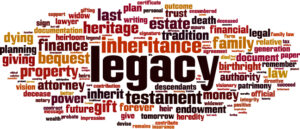
When I was young, my grandparents had a giant book on their bookshelf avoiding probate. I thought I wanted to be a lawyer, so I tried to read the book. I was ten at the oldest, and it was the most boring thing I ever tried to read. I made it to page 5 or 6. I haven’t read a book about probate since then, but I have studied it. Remember, you should discuss your estate needs with your attorney because I am a financial planner, not an attorney, and I am not giving you legal advice. However, I find that my clients often don’t understand wills or probate, so I want to discuss a few key points here.
- You have a will so that you do not die intestate. When you do not have a will, your estate goes into the court system to decide how the assets should be divided among your family members. If your desires are anything other than the mandated inheriting chart—a common occurrence—you must have a will.
- Assets in a will are still subject to probate. Probate is the legal system that ensures your estate is settled properly, your bills are paid, and parties with an interest in your estate have an opportunity to be heard. Of course, probate also takes time and can be expensive. People like to avoid probate, as the book I tried to read proves. However, a will is not your solution to avoiding probate.
- Assets are protected from probate if they are in a trust, are provided to you as a beneficiary of a policy or account, or if they pass to you through some form of survivorship titling. These assets pass directly to you without further legal proceedings. The rules vary state by state, so you should seek the advice of a professional in your area.
- Although holographic wills (or wills in your handwriting) are legal in many states, you shouldn’t try to create your own will. Find a good estate attorney who will help you draft something that follows your wishes. Boilerplate wills are only as good as the service that drafts them, and you could run into issues about their being accepted in your state or standing up in court if someone wants to contest your final wishes. Even wills and trusts drafted by attorneys can have problems in the legal system if someone seeks to cause trouble. The attorney is worth your money.
Remember that your will is only part of your estate and end-of-life plan. You also need powers of attorney and living wills. Additionally, you may need a trust, and an attorney can help you make these decisions. Your last gift is creating a legacy that helps your family prosper.

